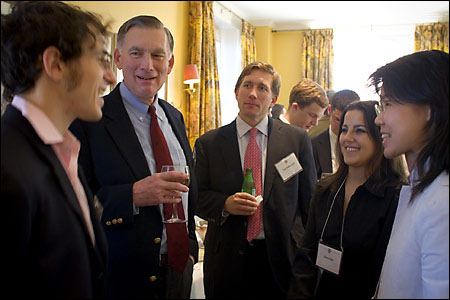Ashfords support grad students
Family fellowship programs help draw best and brightest

Hearing that Harvard faced serious competition from other schools for the most talented graduate students spurred the Ashford family into action. “I understood that something needed to be done right away or we would begin to fall behind,” explains Theodore H. Ashford ’58. As a family, Ashford and his wife, Jane (who died in 2003), with sons Theodore III ’86 and Timothy ’88 established two fellowship programs – the Ashford Graduate Fellowship in the Sciences and the Ashford Dissertation Fellowship. This fall, the second class of fellows received their awards, and on Monday (Nov. 14) all eight students joined together with the Ashfords for a celebratory luncheon.
Angela Berg benefits from the sciences fellowship. She examines bird flight – specifically, how birds maneuver during flapping flight – combining biology with the mathematical modeling that she began studying as a Duke University undergraduate. “My intention is to pursue a career in academia conducting research and teaching,” says Berg. “The Ashford Fellowship allows me to attend scientific conferences, which helps me as I work toward that goal.” She also hopes to graduate with as little outstanding undergraduate debt as possible, a significant consideration when pursuing a career in a field that is not especially remunerative.
Christopher Phillips’ dissertation fellowship enables him to view his subject more broadly. Phillips studies the history of mathematics education, with a particular focus on the interactions among high schools and colleges, schools of education, and schools of arts and sciences. “The Ashford Dissertation Fellowship gives me the freedom to analyze the historical trajectory of those interactions year-round,” he says. “This kind of continual study would not normally be possible without such funding.”
Even though Oana Dan only arrived at Harvard in September, the Ashford Dissertation Fellowship has already had an impact. “As an international student from Romania, financial help is essential to me,” Dan says, “especially if it is related to research and dissertation completion.” A graduate student in sociology, she maintains interests in political sociology and transnational comparisons. The fellowship will assist her in the process of defining her thesis topic, which will probably examine political integration issues – such as the expansion of the European Union, and the interplay between states and transnational organizations – and globalization. “I know that the fellowship will make research and dissertation writing much easier by eliminating some of the financial stress, as I will likely conduct research outside the United States.”
For the Ashfords, their gift has become more than just helping an institution garner the best students. They have found much more meaning in the aid they give each fellow as an individual – support rooted in Jane Ashford’s influence. “She always told us to find good people and help them,” says Timothy Ashford. So far, the Ashford family’s generosity has made a genuine difference to eight talented graduate students.




